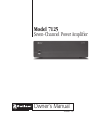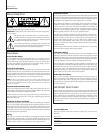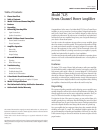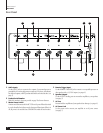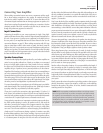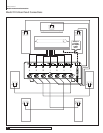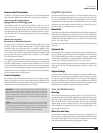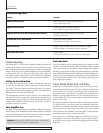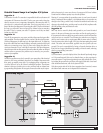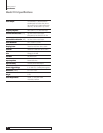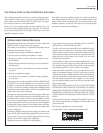
8
Outlaw Audio
Owner’s Manual
Troubleshooting Guide
Problem Solutions
Amplifier will not turn on Master Power Switch turned off (No power light LED)
Turn on Master Power Switch
Amplifier will not turn on Remote trigger cable not properly connected
Verify connection of trigger cable at both ends
Amplifier turns on, but no audio from one or more channels Input plugs not connected to proper jack or are loose
Check input connections
No audio from one or more channels Speakers not connected properly
Check speaker connections at amp and speaker
Audio levels differ Improper settings or output levels from the processor or controller
Check the settings on your preamp, processor or controller
Audio plays, then cuts off Amplifier shorted
Check speaker connections for short circuit at amp and speaker
Troubleshooting
Your Outlaw Model 7125 Seven-Channel Amplifier is designed for trouble free
operation. If you follow the instructions in this manual you should enjoy many
years of high quality listening enjoyment. However, as with any sophisticated
electronic device, there may be occasional problems upon initial installation,
or during the life of the unit. The items on this list are a brief guide to the
minor problems that you may be able to correct yourself. If these solutions do
not rectify a problem, or if the problem persists, contact us for assistance.
Outlaw Service Information
If you follow the instructions in this manual you should enjoy many years
of trouble free operation and, of course, high quality listening enjoyment.
The Outlaw 7125 does not contain any user serviceable parts. If you suspect a
problem that may require service assistance, contact us at customerservice@
outlawaudio.com, or by phone at 866-688-5292.
It is important that any repairs be carried out only by a service agent that we
authorize. This will assure proper service and preserve the protection of your
Limited Warranty. Keep your sales slip or receipt in a safe place with this manual
so that it will be available to verify the purchase date, should you experience
a problem covered by our warranty.
Main Amplifier Fuse
The Outlaw 7125 uses internal fuses to protect both the amplifier and your speak-
ers from damage. In the event that a fuse replacement is required, be certain that
a fuse of the original rating is used. If a fuse continues to fail, your unit may have
developed a fault. In this event, please contact us for assistance.
WARNING: Always turn the amplifier off and remove the power cord
from the source of AC Power before replacing the fuse.
Protection Mode
Under some conditions, such as a shorted speaker wire, DC voltage on an input
connection or thermal overload, the Outlaw 7125 will place itself in a protect
mode to prevent damage to the amplifier. When this happens the amplifier
will mute to protect both the amplifier and speakers from damage. Should this
occur, IMMEDIATELY turn the unit off, using the Power Switch, and disconnect
the AC power cord. Examine all speaker connections to make certain that there
are no shorts. Turn the unit back on. If the unit continues to go into the protect
mode, contact us for assistance.
A Few Words About Hum and Noise
Audible hum, or a discernable low frequency noise, is one of the most com-
mon problems in audio/video systems. This hum, which may be present even
when the volume is at a low level or when the power is off, is usually caused
by a problem known as “ground loops.” A ground loop occurs when there is a
difference in ground voltages between two or more components that are con-
nected electrically. This, in turn, creates multiple current paths and causes the
low-level noise, or hum.
The growing sophistication of home theater systems, and the increased number
of components used to create these systems has dramatically increased the
potential for the possibility of ground loops. While it is natural to suspect that
the components in your system are the cause of the hum, in many cases the
cause may be due to other conditions. In particular, cable TV connections from
outside the house have become a major source of hum.
In most cases, one of the following suggestions should help you to solve a
hum problem in your system. Please try these steps in the sequence shown,
proceeding from one step to the next if the prior suggestion does not eliminate
the problem.
Troubleshooting



